Andrés Monroy-Hernández
Empowering Children to Create AI-Enabled Augmented Reality Experiences
Aug 11, 2025Abstract:Despite their potential to enhance children's learning experiences, AI-enabled AR technologies are predominantly used in ways that position children as consumers rather than creators. We introduce Capybara, an AR-based and AI-powered visual programming environment that empowers children to create, customize, and program 3D characters overlaid onto the physical world. Capybara enables children to create virtual characters and accessories using text-to-3D generative AI models, and to animate these characters through auto-rigging and body tracking. In addition, our system employs vision-based AI models to recognize physical objects, allowing children to program interactive behaviors between virtual characters and their physical surroundings. We demonstrate the expressiveness of Capybara through a set of novel AR experiences. We conducted user studies with 20 children in the United States and Argentina. Our findings suggest that Capybara can empower children to harness AI in authoring personalized and engaging AR experiences that seamlessly bridge the virtual and physical worlds.
Redefining Research Crowdsourcing: Incorporating Human Feedback with LLM-Powered Digital Twins
May 29, 2025Abstract:Crowd work platforms like Amazon Mechanical Turk and Prolific are vital for research, yet workers' growing use of generative AI tools poses challenges. Researchers face compromised data validity as AI responses replace authentic human behavior, while workers risk diminished roles as AI automates tasks. To address this, we propose a hybrid framework using digital twins, personalized AI models that emulate workers' behaviors and preferences while keeping humans in the loop. We evaluate our system with an experiment (n=88 crowd workers) and in-depth interviews with crowd workers (n=5) and social science researchers (n=4). Our results suggest that digital twins may enhance productivity and reduce decision fatigue while maintaining response quality. Both researchers and workers emphasized the importance of transparency, ethical data use, and worker agency. By automating repetitive tasks and preserving human engagement for nuanced ones, digital twins may help balance scalability with authenticity.
FareShare: A Tool for Labor Organizers to Estimate Lost Wages and Contest Arbitrary AI and Algorithmic Deactivations
May 13, 2025
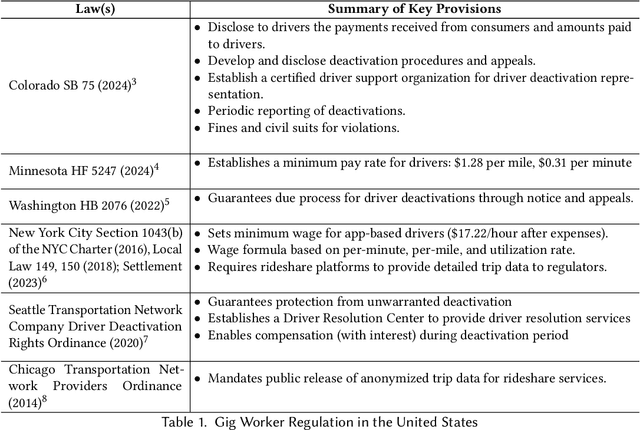
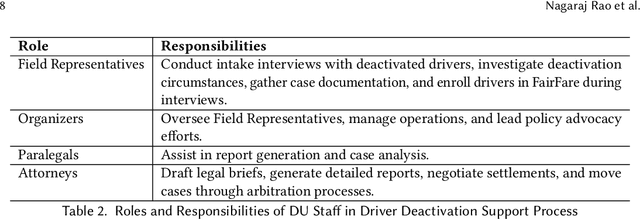

Abstract:What happens when a rideshare driver is suddenly locked out of the platform connecting them to riders, wages, and daily work? Deactivation-the abrupt removal of gig workers' platform access-typically occurs through arbitrary AI and algorithmic decisions with little explanation or recourse. This represents one of the most severe forms of algorithmic control and often devastates workers' financial stability. Recent U.S. state policies now mandate appeals processes and recovering compensation during the period of wrongful deactivation based on past earnings. Yet, labor organizers still lack effective tools to support these complex, error-prone workflows. We designed FareShare, a computational tool automating lost wage estimation for deactivated drivers, through a 6 month partnership with the State of Washington's largest rideshare labor union. Over the following 3 months, our field deployment of FareShare registered 178 account signups. We observed that the tool could reduce lost wage calculation time by over 95%, eliminate manual data entry errors, and enable legal teams to generate arbitration-ready reports more efficiently. Beyond these gains, the deployment also surfaced important socio-technical challenges around trust, consent, and tool adoption in high-stakes labor contexts.
QuaLLM: An LLM-based Framework to Extract Quantitative Insights from Online Forums
May 08, 2024



Abstract:Online discussion forums provide crucial data to understand the concerns of a wide range of real-world communities. However, the typical qualitative and quantitative methods used to analyze those data, such as thematic analysis and topic modeling, are infeasible to scale or require significant human effort to translate outputs to human readable forms. This study introduces QuaLLM, a novel LLM-based framework to analyze and extract quantitative insights from text data on online forums. The framework consists of a novel prompting methodology and evaluation strategy. We applied this framework to analyze over one million comments from two Reddit's rideshare worker communities, marking the largest study of its type. We uncover significant worker concerns regarding AI and algorithmic platform decisions, responding to regulatory calls about worker insights. In short, our work sets a new precedent for AI-assisted quantitative data analysis to surface concerns from online forums.
Humans, AI, and Context: Understanding End-Users' Trust in a Real-World Computer Vision Application
May 15, 2023



Abstract:Trust is an important factor in people's interactions with AI systems. However, there is a lack of empirical studies examining how real end-users trust or distrust the AI system they interact with. Most research investigates one aspect of trust in lab settings with hypothetical end-users. In this paper, we provide a holistic and nuanced understanding of trust in AI through a qualitative case study of a real-world computer vision application. We report findings from interviews with 20 end-users of a popular, AI-based bird identification app where we inquired about their trust in the app from many angles. We find participants perceived the app as trustworthy and trusted it, but selectively accepted app outputs after engaging in verification behaviors, and decided against app adoption in certain high-stakes scenarios. We also find domain knowledge and context are important factors for trust-related assessment and decision-making. We discuss the implications of our findings and provide recommendations for future research on trust in AI.
"Help Me Help the AI": Understanding How Explainability Can Support Human-AI Interaction
Oct 02, 2022

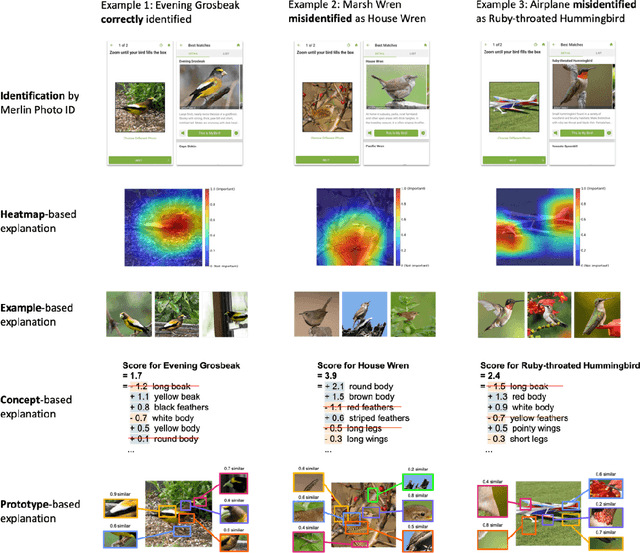
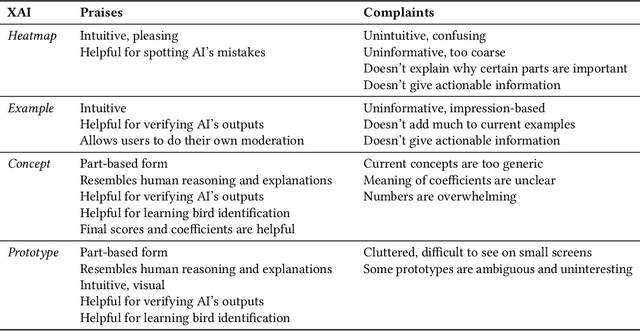
Abstract:Despite the proliferation of explainable AI (XAI) methods, little is understood about end-users' explainability needs. This gap is critical, because end-users may have needs that XAI methods should but don't yet support. To address this gap and contribute to understanding how explainability can support human-AI interaction, we conducted a study of a real-world AI application via interviews with 20 end-users of Merlin, a bird-identification app. We found that people express a need for practically useful information that can improve their collaboration with the AI system, and intend to use XAI explanations for calibrating trust, improving their task skills, changing their behavior to supply better inputs to the AI system, and giving constructive feedback to developers. We also assessed end-users' perceptions of existing XAI approaches, finding that they prefer part-based explanations. Finally, we discuss implications of our findings and provide recommendations for future designs of XAI, specifically XAI for human-AI collaboration.
Calendar.help: Designing a Workflow-Based Scheduling Agent with Humans in the Loop
Mar 24, 2017
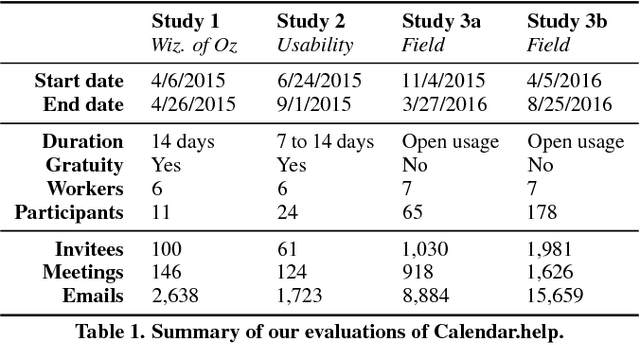
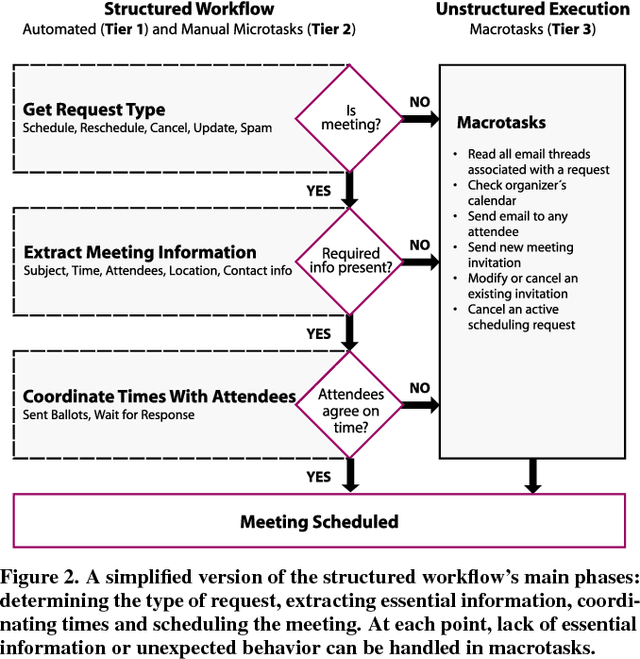
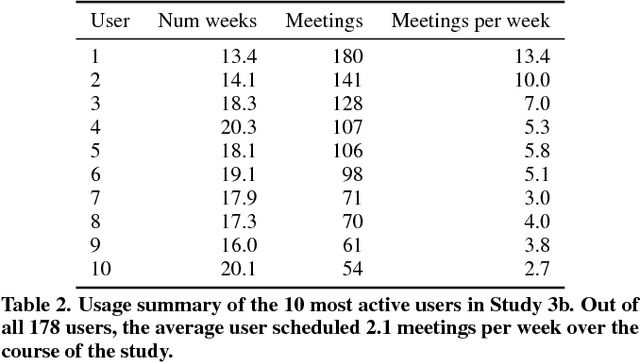
Abstract:Although information workers may complain about meetings, they are an essential part of their work life. Consequently, busy people spend a significant amount of time scheduling meetings. We present Calendar.help, a system that provides fast, efficient scheduling through structured workflows. Users interact with the system via email, delegating their scheduling needs to the system as if it were a human personal assistant. Common scheduling scenarios are broken down using well-defined workflows and completed as a series of microtasks that are automated when possible and executed by a human otherwise. Unusual scenarios fall back to a trained human assistant who executes them as unstructured macrotasks. We describe the iterative approach we used to develop Calendar.help, and share the lessons learned from scheduling thousands of meetings during a year of real-world deployments. Our findings provide insight into how complex information tasks can be broken down into repeatable components that can be executed efficiently to improve productivity.
 Add to Chrome
Add to Chrome Add to Firefox
Add to Firefox Add to Edge
Add to Edge